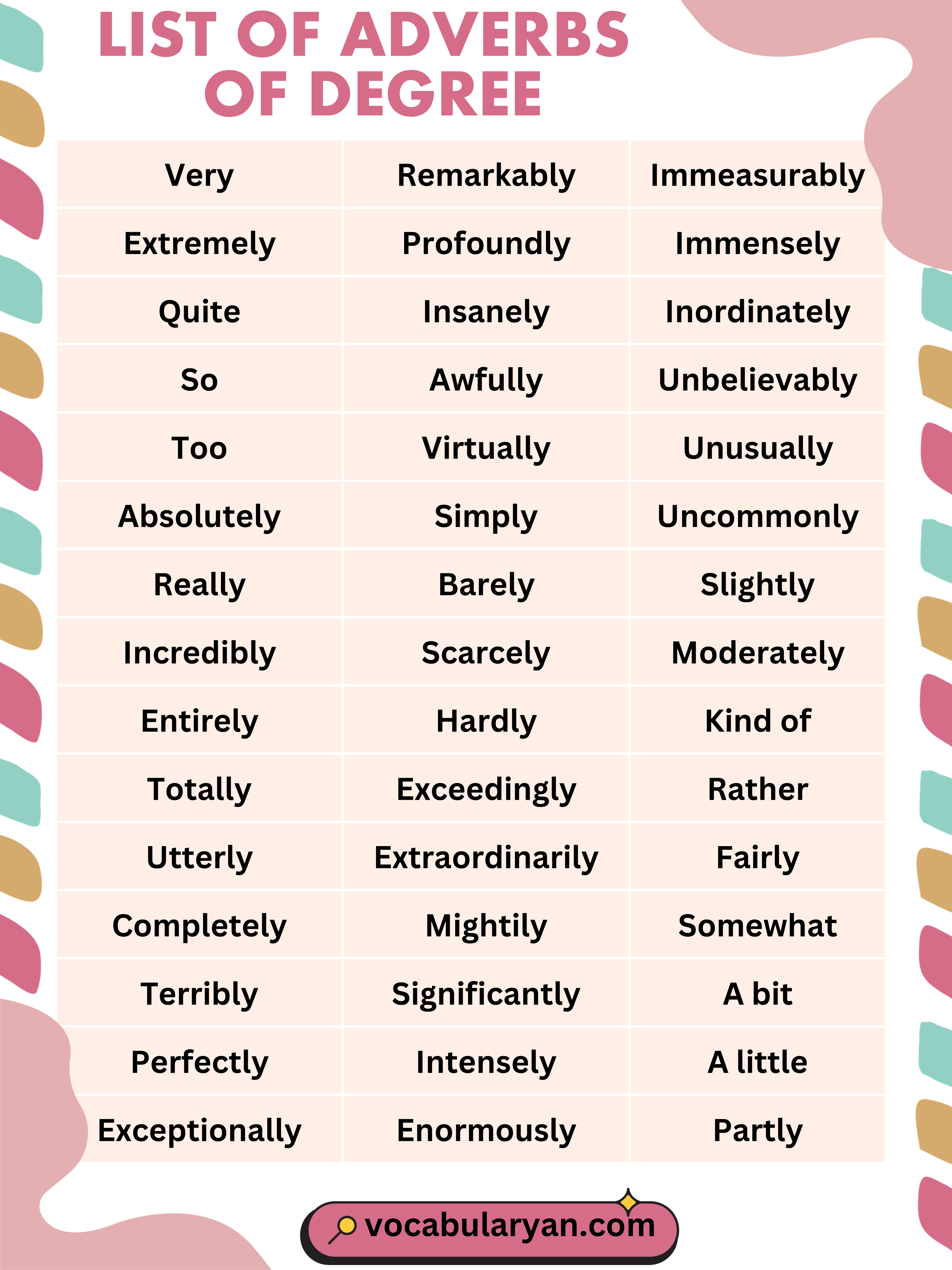Learning Adverbs of Degree in English helps describe how much or to what extent something happens. Words like very, too, and quite show intensity, while others like almost, completely, and hardly give more precise meaning. Additionally, adverbs such as extremely, fairly, and totally help modify adjectives, verbs, or other adverbs for clearer expression. Whether you’re writing, speaking, or learning grammar, this list of degree adverbs supports accurate and effective communication by adding depth and detail to your sentences.
Adverb of Degree
Adverbs of degree show how much, how little, or to what extent something happens. Common examples include very, quite, almost, too, and extremely. They usually modify adjectives, verbs, or other adverbs, helping to make meaning more specific.
Here are some common adverbs of degree:
Very: It indicates a high degree or intensity.
Example: She is very talented.
Quite: It means to a moderate extent or degree.
Example: The movie was quite interesting.
Too: It indicates an excessive or undesirable degree.
Example: The coffee is too hot to drink.
Extremely: It signifies a very high degree of intensity.
Example: The weather is extremely cold in winter.
So: It indicates a high degree or to such an extent.
Example: He is so funny that everyone laughs.
Rather: It suggests a somewhat high degree but not excessively so.
Example: The food was rather spicy for my taste.
Fairly: It means to a moderate degree.
Example: It’s fairly easy to learn how to ride a bicycle.
Somewhat: It indicates a slight or moderate degree.
Example: The book is somewhat interesting.
Absolutely: It signifies a complete or total degree.
Example: The view from the top of the mountain is absolutely breathtaking.
Completely: It means entirely or with no exceptions.
Example: He completely forgot about our meeting.
Partly: It indicates only a portion or part of something.
Example: I’m partly responsible for the project’s success.
Nearly: It means almost but not completely.
Example: We are nearly finished with the project.
Barely: It indicates just barely or almost not at all.
Example: He barely passed the exam.
Almost: It means nearly all but not completely.
Example: I’ve almost finished reading the book.
Entirely: It signifies a complete or whole degree.
Example: The room was entirely empty.

Types of Adverbs of Degree
Adverbs of degree, also known as degree adverbs, are a specific category of adverbs that modify adjectives, adverbs, or verbs to indicate the intensity, extent, or degree of an action or description. There are several types of adverbs of degree based on their specific functions and the degree they convey. Here are the main types:
Intensifiers
These adverbs increase the degree or intensity of the adjective, adverb, or verb they modify. They make the action or quality stronger.
Examples: very, extremely, quiet, so, too, absolutely, really, incredibly, utterly, terribly.
Mitigators or Downtowners
These adverbs reduce or soften the degree or intensity of the adjective, adverb, or verb they modify. They make the action or quality weaker.
Examples: somewhat, rather, fairly, a bit, a little, kind of, quiet.
Absolute Degree Adverbs
These adverbs indicate the highest or lowest possible degree. They suggest that there’s no room for further increase or decrease in intensity.
Examples: absolutely, completely, entirely, utterly, totally.
Comparatives
While not typical adverbs, comparative forms of adjectives can function as adverbs of degree when comparing the degree of one action or quality to another. They often end in “-er” or use “more” before the adjective.
Examples: faster, taller, more interesting, less expensive.
Superlatives
Like comparatives, superlative forms of adjectives can act as adverbs of degree to compare the degree of one action or quality to all others. They typically end in “-est” or use “most” before the adjective.
Examples: fastest, tallest, most interesting, least expensive.
Exclusives
These adverbs emphasize that something is the only option or outcome, indicating a high degree of exclusivity.
Examples: only, solely, exclusively, entirely.
These various types of adverbs of degree help convey nuances in language and allow for precise communication of the degree or intensity of actions, qualities, or conditions.
List of Adverbs of Degree
List of adverbs of degree that can be used to modify adjectives, adverbs, or verbs to indicate the intensity, extent, or degree of an action or quality:
- Very
• Extremely
• Quite
• So
• Too
• Absolutely
• Really
• Incredibly
• Entirely
• Totally
• Utterly
• Completely
• Terribly
• Perfectly
• Exceptionally
• Remarkably
• Profoundly
• Awfully
• Virtually
• Simply
• Barely
• Scarcely
• Hardly
• Exceedingly
• Extraordinarily
• Mightily
• Significantly
• Intensely
• Enormously
• Immeasurably
• Immensely
• Inordinately
• Unbelievably
• Unusually
• Uncommonly
• Slightly
• Moderately
• Kind of
• Rather
• Fairly
• Somewhat
• A bit
• A little
• Partly
• Almost
• Nearly
• About
• Just
• Only

